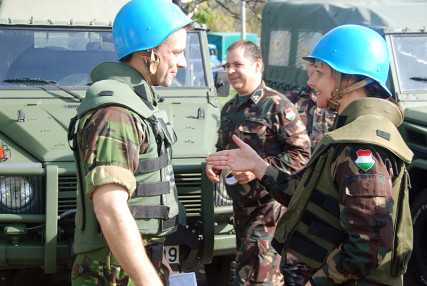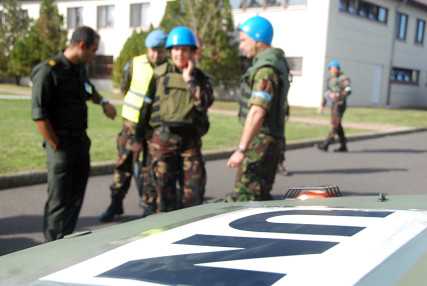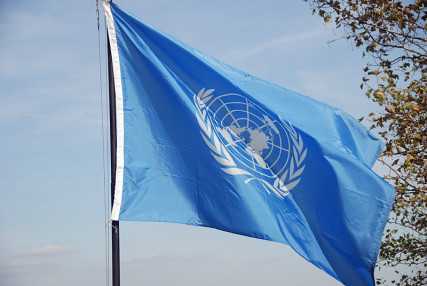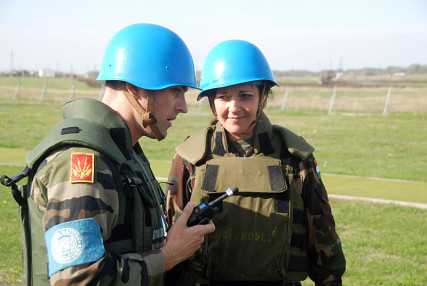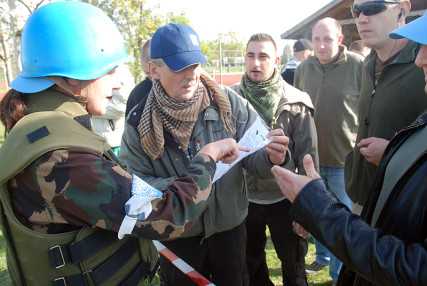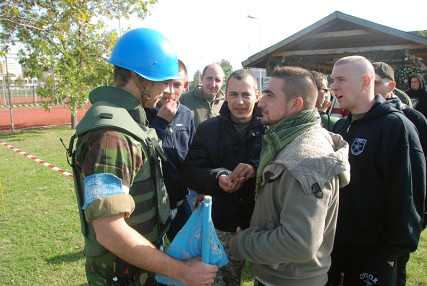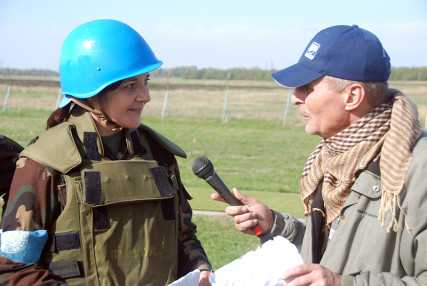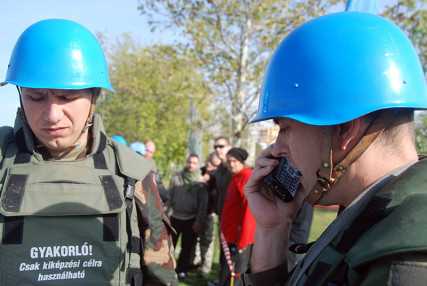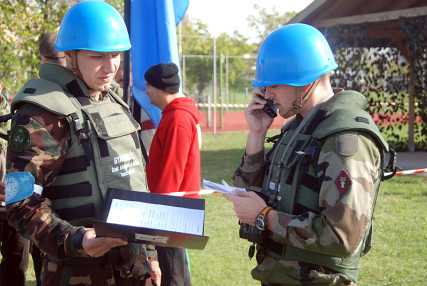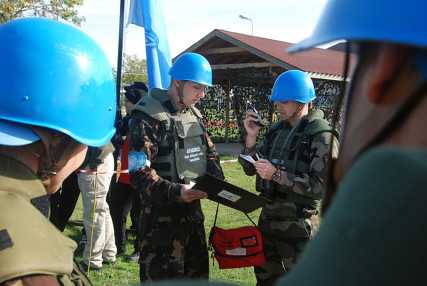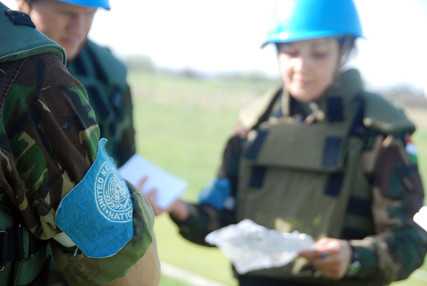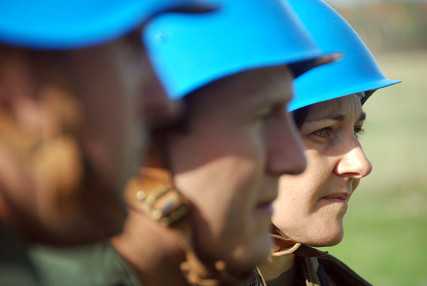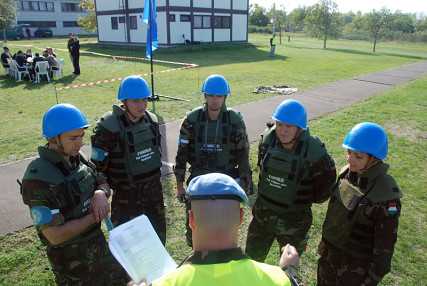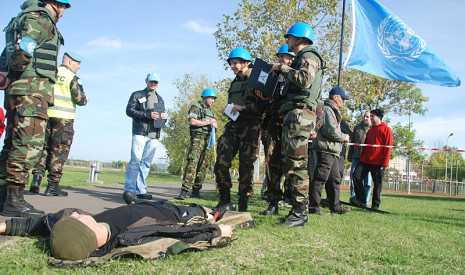The Situation in the Camp is Critical
Szöveg: László Szűcs | 2012. október 17. 10:59What is to be done if a mortar shell explodes in a refugee camp, wounding a man seriously? What is the protocol that applies when someone is distributing leaflets among the refugees to deliberately misinform them? Among others, we received answers to these questions at the closing exercise of the 24th International Military Observer Course (IMOC) in Szolnok. Reporting from the spot.
Galéria
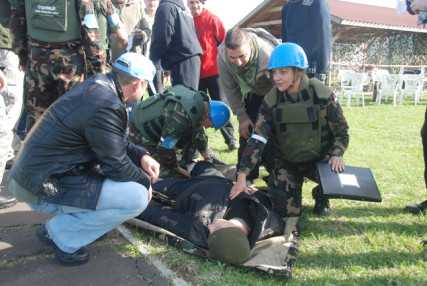
“Come over here, look what’s happened to our brother!", a man urges the blue-beret UN soldiers appearing beside the refugee camp. “Hurry on because he is about to die, heal him please!", says another man who does not even attempt to hide a rusty mortar shell in his hand, whose shape resembles a sugar-beet drawn from under the ground.
For a moment, the astounded patrol leader is at a loss for words; then he asks in English the man dangling the shell to put the dangerous UXO on the ground. Speaking through the interpreter coming with the patrol, he repeats the warning in the native tongue of the resident of the camp too, but the man is still unwilling to obey the firm order.
One dollar per kilogram
Meanwhile the injured man keeps moaning, wailing, screaming and shouting loudly, scolding everybody, the soldiers for the most part for not helping him and letting him bleed to death instead. His legs have been mangled completely in the shell explosion, so the servicewoman leading the patrol examines him and asks the medic immediately to treat the injured within their possibilities and request a MEDEVAC helicopter from the patrol base without delay.
The residents of the refugee camp are surrounding the peacekeepers. They are vying to relate, explain and act out how the shell exploded after their mate brought it to the camp so that they can hand it over to the UN troops, because they ask them to do so on the leaflets they distributed among them. Some even add that “we still have some rusty junks like this here, for which we were promised to be paid one dollar per kilogram" in the UN office. “Take them away and give us the money", they shout.
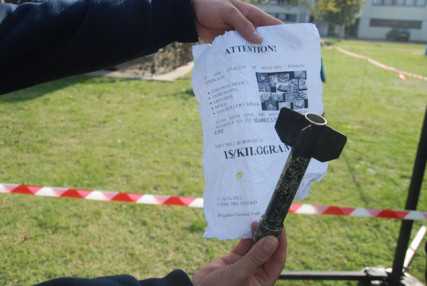
At this point the patrol leader begins to suspect something and asks them to show her the leaflets. All leaflets prove to be fakes in no time, so somebody (presumably their enemies) sent the bunch of papers to the residents of the refugee camp in order to trick them into collecting the dangerous UXOs strewn across the area, in the hope that some of them would explode in their hands…
“The UN has not issued such a document!" – the patrol leader tells the people speaking through the interpreter, and apparently this comes as bad news to the residents of the camp. They keep shouting louder and louder, many of them shaking their fists at the soldiers, saying “somebody has made a fool of us". They collected the shells to earn money, to be able to feed their children.
Chaos and the journalist
Even a layman can see clearly the chaos breaking out in the area. What is more, a journalist turns up who is keen to learn what has happened here in the last couple of minutes and why the soldiers delay taking action.
“The situation in the camp is critical!", the radio operator of the patrol reports to the center. He adds that they still keep the situation under control, and calls out a UN EOD team to the site as soon as possible….
“The soldiers of an unarmed UN mission may encounter a situation like this anytime", Maj. Róbert Nagy, the acting deputy commander of the HDF Peace Support Training Center tells us as we are watching the patrol’s activity together.
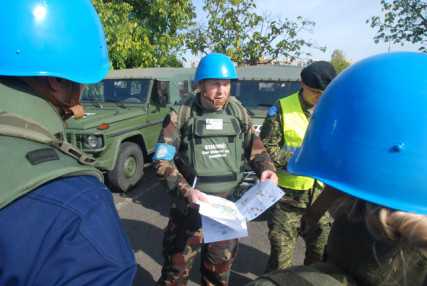
The Szolnok-based unit is hosting the International Military Observer Course (IMOC), which is organized for the 24th time. At a site accredited by the UN Department of Peacekeeping Operations, the Hungarian and foreign soldiers enrolled on the course learn how to execute their tasks in an unarmed observer mission conducted under the umbrella of the world organization.
“The UN operates such missions in Lebanon and the Western Sahara, so that sooner or later those enrolled on the IMOC will want to deploy in some areas of operations", says Maj. Nagy, the deputy director of the course in progress.
There are only a dozen training facilities like the one in Szolnok in the whole world, so it is no accident that there are always a lot of applicants for the Hungarian-run IMOC. This time 32 soldiers have started the course, among them 15 foreign ones coming from 12 countries.
A special course
This year’s course is extraordinary in several respects. “Never has the number of instructors been so high. Nine instructors from five countries are training the students here, among them one woman, which is unique too. Furthermore, two of the instructors are volunteer operational reservists who have already participated in similar trainings and now, with the establishment of the Volunteer Reserve System, they have a chance to spend part of their preset annual time in service in the training center", the major notes and goes on to tell us that this three-week course is based on the training modules specified by the UN Department of Peacekeeping Operations. Of course, the course starts with classroom instruction, but they lay great emphasis on hands-on training as well.
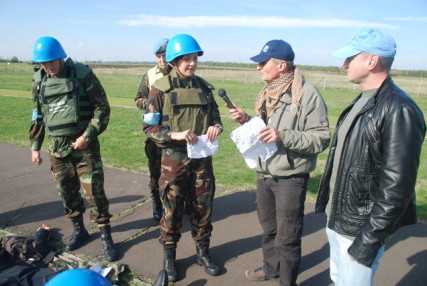
As we are talking, the situation at the refugee camp seems to be defused, thanks to the situational awareness of the patrol. The seriously injured man has already been transported by the medics, and the EOD team has collected the UXOs. The patrol requests and is given permission to proceed. The headquarters ordered them to complete a 24-kilometer patrol route, and they are still a long way from the end of it.
“And they still have many challenges ahead of them,", Maj. Róbert Nagy says knowingly. Of course, he is not allowed to reveal the exact details of the difficulties that the peacekeepers are tasked to overcome. This secrecy is no accident, since for every student, the successful completion of the two-day closing exercise at the end the course is a precondition for their deployment with a UN observer mission in the future. And if they know the tasks in advance, the examining instructors will not be able to assess their knowledge objectively.
Photos by the author
